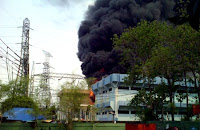 Compiled from The Associated Press, VOA News, RTTNews, & others
Compiled from The Associated Press, VOA News, RTTNews, & othersIndonesia's meteorological agency says a powerful earthquake has shaken western Indonesia. The Pacific Tsunami Warning Center issued a tsunami alert for Indonesia, Malaysia, India and Thailand.
The Indonesian agency said the tremor had a magnitude of 7.6. Its epicenter was just off the coast of Sumatra. The U.S. Geological Survey put the strength at 7.9.
Indonesian television reported that hundreds of buildings had collapsed and many people were feared trapped under the rubble.
A disaster management official says at least 13 people have been killed and thousands trapped under flattened buildings in a powerful earthquake in western Indonesia.
Rustam Pakaya, head of the Health Ministry's crisis center, said a field hospital was being prepared to assist the injured and medical teams were on the way from neighboring provinces.
Officials said the quake triggered a landslide that cut off land transport to the area closest to the epicenter. Power and telecommunications were also cut.
Tsunami in South Pacific islands
Eanwhile in south Pacific, a massive tsunami unleashed by a powerful earthquake flattened Samoan villages and swept cars and people out to sea, killing more than 100 and leaving dozens missing Wednesday. The death toll was expected to rise.
Survivors fled the fast-churning water for higher ground on the South Pacific islands and remained huddled there hours after the quake, with a magnitude between 8.0 and 8.3, struck around dawn Tuesday.
The quake was centered about 120 miles south of the islands of Samoa, which has about 180,000 people, and American Samoa, a U.S. territory of 65,000.
Four tsunami waves 15 to 20 feet (4 to 6 meters) high roared ashore on American Samoa, reaching up to a mile (1.5 kilometers) inland, Mike Reynolds, superintendent of the National Park of American Samoa, was quoted as saying by a parks service spokeswoman.
Less than 24 hours later, another strong underwater earthquake rocked western Indonesia on Wednesday, briefly triggering a tsunami alert for countries along the Indian Ocean and sending panicked residents out of their houses. The quake toppled buildings, cut power and triggered a landslide on Sumatra island, and at least 13 people were reported killed.
SEE ALSO:
Eyewitness: On air when tsunami hit – BBC
VIDEO: 7.6 Richter Quake Rocks Sumatra – Viva News
More News on Indonesian earthquake - Google
More News on Tsunami in south Pacific – Google










.jpg)















